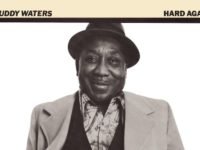Little Walter Jacobs, who passed away on Feb. 15, 1968 at just 37, did some — but by no means all — of his most rowdy, thrilling work alongside Muddy Waters in the early 1950s, as he became the first to test the true limits of harmonica amplification. For a peek at some of the best early sides that haven’t been issued under Waters’ name, dig into Delmark Records’ essential 1988 release The Blues World of Little Walter.
Made up of 13 sides recorded for the Parkway, JOB and Regal imprints in 1950 and ’51, it still runs rivulets through much of the young-punk junk that passes for “blues” these days. The Louisiana-born Little Walter, though not yet at the peak of his powers in bending the harp into this dangerous, distorted sound, is already playing with an unfettered, naked fierceness — with or without Muddy Waters.
Thing is, though, Muddy occasionally appears as a glorified sideman here too, only adding to the unheralded cache of The Blues World of Little Walter. With the spotlight elsewhere, Waters is free to roam around behind the band, riffing like a man possessed. Little Walter, meanwhile, is beginning to explore dissonance, moving around on the raggedy edge of his instrument, and all the while working in breathless emotion.
Even in these lesser-known moments, it’s clear how easy their brilliance came. They didn’t have to work at it, the way later, better-fed generations did. (Muddy Waters admitted as much, in a talk with subsequent sideman Bob Margolin, when he said “getting it right is gonna hurt like being in love.”) There’s no reasonable argument against professionalism, I suppose. But you just can’t deny the first-take joys of Muddy Waters yelping in the background once more while Little Walter blows.
There was some controversy surrounding these sessions, back then. The great “Rollin’ and Tumblin'” appears on The Blues World of Little Walter both as a strict vocal track — and as moaned-not-sung instrumental. Leonard Chess apparently took issue with Muddy Waters recording “Rollin'” for another label, and had him do a version for Aristocrat (which later became Chess) the following month. It’s heard here as a raw-boned first draft, full of fantastically ill-considered feeling.
The support group on The Blues World of Little Walter, which was remastered from the original tapes by Delmark, boasts connections to Muddy Waters as deep as Little Walter’s, by the way.
There’s Baby Face Leroy, who had popularized that slowed-down emphatic drum sound of Chicago blues on the early Waters sides, and early bassist Ernest “Big” Crawford. There’s Jimmy Rogers, who the liner notes surmise appears on two cuts. Rogers was Muddy Waters’ incredibly intuitive sideman during the early 1950s. Then there’s Sunnyland Slim, who helped the young Waters, just hitting town from Clarksdale, Mississippi, record those first sides for Aristocrat. Slim was the oldest cat on those records, and he outlived them all.
- Nick DeRiso’s Best of 2015 (Rock + Pop): Death Cab for Cutie, Joe Jackson, Toto + Others - January 18, 2016
- Nick DeRiso’s Best of 2015 (Blues, Jazz + R&B): Boz Scaggs, Gavin Harrison, Alabama Shakes - January 10, 2016
- Nick DeRiso’s Best of 2015 (Reissues + Live): John Oates, Led Zeppelin, Yes, Faces + others - January 7, 2016


